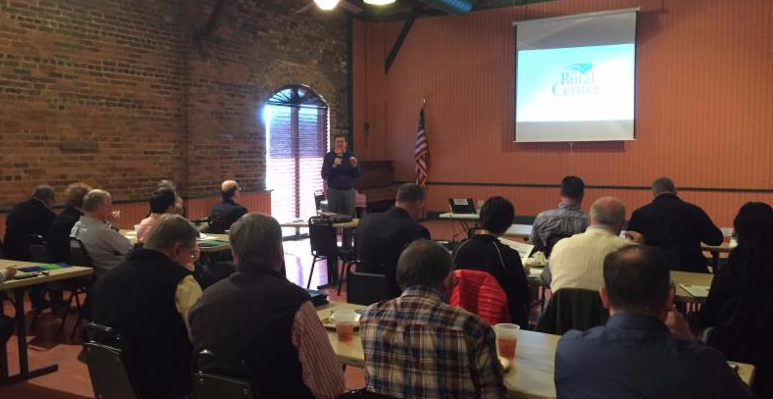 |
|
REGISTRATION IS OPEN FOR RURAL DAY
|
This is going to be a day you don't want to miss.
On Tuesday, May 9, rural champions will arrive from all corners of the state to gather, learn, network, and tell their leaders about the value of rural North Carolina.
Join us on Tuesday, May 9, at the NC Museum of History for a morning Convocation, where we will hear from top state leaders about their vision for rural North Carolina and learn more about how to effectively engage with our elected officials when meeting one-on-one.
Then, we will move to the NC Legislative Building, where you can visit your representatives in the House and Senate and browse the Rural Fair, where more than 20 organizations from around the state who are focused on a variety of economic development issues will be on hand to answer your questions and provide you with information you can take directly to your elected officials.
We will cap off the day with a celebration at the Executive Mansion, where you can network with other rural advocates and share your experiences meeting with leaders.
And, if one day with us just doesn't sound like enough, come early for a special Monday evening event on May 8 at the Rural Center. We're calling it
Reel Rural: Documenting rural life. More details to come!
Register today, tell all your friends, and join us in Raleigh as we put rural North Carolina's best foot forward.

John Coggin
Director of Advocacy
|
|
 |

MARCH 22: WEBINAR -
COMMUNITY ENGAGEMENT POST-HURRICANE MATTHEW
Learn how to connect to leaders & resources
With the first round of disaster relief coming into affected areas, it is easy to be confused about what types of support are available and how to access resources. Further, the prospect of engaging with local and state officials to communicate needs and advocate for appropriate usage of funds can be intimidating.
Join the Rural Center and our partners on Wednesday, March 22, at 3:00 p.m. for an
important conversation about how to best engage with community and state leaders to find and secure the help available in the wake of Hurricane Matthew. Hear from experts about the varieties of assistance currently available, learn the most productive ways to approach leaders as decisions are made about how to dispense local relief, and ask questions of leaders and citizens who have been through it all before after previous disasters.
If your home or business has been impacted by Hurricane Matthew, make sure to come hear how to simplify the process and amplify your voice as you get back on your feet.
|

APRIL 5: WEBINAR - BRIDGING THE RURAL/URBAN DIVIDE
Learn how to advocate for connections over divisions
Join us on Wednesday, April 5, at 3:00 p.m. as we talk with the Urban Institute at the University of North Carolina at Charlotte about the dreaded "rural/urban divide" that has captured the imaginations of many people since the 2016 election.
Are we truly that divided? What connections and inter-dependencies exist between the rural and urban areas in North Carolina? And, most importantly, what policies could be implemented to help lift up people in all communities in North Carolina?
You don't want to miss this dynamic webinar that will break down the idea of the "divide" between rural and urban, and give you ideas about how to incorporate messages about the important connections among all our communities in your advocacy.
Register today!
|

MAY 9: RURAL DAY
Join us in Raleigh to show NC that #RuralCounts
For the first time in our history, the Rural Center will be hosting a statewide Rural Day on Tuesday, May 9.
What does this mean? This is your chance to join with hundreds of other rural citizens and advocates to communicate to our leaders a positive message about the value of rural North Carolina.
The day will be filled with one-on-one and group meetings with legislators and executive leaders, educational sessions about various issues facing rural North Carolina, and plenty of time to network with other rural advocates from across the state.
|
|
NEWS FROM THE RURAL CENTER
|

RURAL CENTER VISITS DC
National Rural Health Association hosts policy institute
In February, the Rural Center joined hundreds of rural health champions for the largest rural advocacy event in the country: the National Rural Health Association's (NRHA's) Rural Health Policy Institute.
The focus of the event was
making healthcare work for rural America. As lawmakers begin to address changes to the Affordable Care Act (ACA), they have many opportunities to end burdensome regulations that strain rural health providers and expand healthcare coverage and choice for millions of Americans. Over the week in DC, participants in the Rural Policy Institute heard from experts and leaders in rural health about the biggest issues and some
policy solutions that the NRHA suggests.
Then, we took that message to Capitol Hill. Over a dozen North Carolinians attending the conference spent a whole day visiting our senators and representatives. Most of the attendees were hospital administrators and direct care providers who told their stories of what is working - and what is not - in the current system and suggested improvements that would support rural people and caregivers. The Rural Center highlighted the economic imperative of robust healthcare systems for rural communities. We would like to thank all of our elected officials and their staff who took the time to speak with us:
- Senator Richard Burr
- Senator Thom Tillis
- Rep. Ted Budd
- Rep. G.K. Butterfield
- Rep. Virginia Foxx
- Rep. George Holding
- Rep. Richard Hudson
- Rep. Walter Jones
- Rep. Robert Pittenger
- Rep. David Rouzer
Read more about the Rural Center's
economic case for a strong rural health sector, and be on the lookout for updates and action alerts from the Rural Center as our federal leaders take on healthcare reform.
|

#RURALCOUNTS ROAD TRIP
Visit to McDowell County Kicks Off 80-County Tour
Core to the success of a strong advocacy program are the people on the ground making a difference. The Rural Center spent a year on the road listening to our networks' greatest challenges and opportunities and fashioned the 10 Rural Counts strategies based on their input. Now that we are trying to put these ideas into action, we are going on the road again to inform more people about what is in this plan for rural North Carolina's future and how they can get involved.
This "Rural Center Road Trip" kicked off in February when Rural Center President Patrick Woodie and Advocacy Director John Coggin visited McDowell County. We met in the Historic Marion Train Depot with over thirty leaders of business, government, and education in McDowell County. We heard about many exciting things taking shape in McDowell County, including
McDowell Academy for Innovation, a STEM-based collaboration between McDowell County Schools and McDowell Technical Community College, and the
McDowell Health Coalition, which is bringing dozens of community groups together to think more broadly about health and wellness. We also heard their suggestions for how we can work together to advance the Rural Counts strategies and support even more economic development in the county.
We are in the process of scheduling similar conversations in the rest of the 80 counties the Rural Center serves. If you would like to host a meeting about Rural Counts in your county or for your community group, contact John Coggin at
[email protected].
|
RURAL CENTER JOINS TRANSPORTATION WORKGROUP
Will bring additional rural voice to state infrastructure decisions
In February, the North Carolina Department of Transportation invited the Rural Center to serve on the state's Strategic Transportation Infrastructure workgroup. This body, created as part of the new data-driven infrastructure law passed in 2013, helps score projects brought to the DOT from regional transportation planners (Rural Planning Organizations, or RPOs, and Metropolitan Planning Organizations, or MPOs). The Rural Center will bring a rural-specific voice to the table as projects are scored and decisions are made on which highways, airports, ferry routes, transit systems, and pedestrian and bike paths to build.
Securing a rural-specific voice on this committee was one of the Rural Center's top priorities for 2017. We will give you updates on progress made by this committee in the months ahead, as well as information about potential budgetary and legislative action on transportation infrastructure.
|
THE BIG CRUNCH: DATA FOR ADVOCACY
What impact will tech innovation have on rural jobs?
Advocacy is easier when you are dealing with something certain, something you know. It's when you start looking in the crystal ball and trying to make sense of a possible future with economic uncertainty that things get tricky.
Advocating in uncertainty is the theme of this month's "The Big Crunch" column.
The source data for the following map and table come from the
Institute for Emerging Issues at NC State University. The Disruption Index was central to the IEI 2016 Forum on FutureWork. The map and table is based on the 39 occupations most at risk to technological automation. Projecting future employment change is far harder than quantifying past conditions. The prospects of the data worried me a year ago, and subsequent national reports and analysis have only deepened this concern. The following map and table are useful, but we must understand its limitations. Let's start by reviewing the data together.
The county level IEI data is reflected in the map. The original IEI report highlights small rural counties with limited jobs data makes their projections are more uncertain. IEI states that lower wage jobs are particularly at risk, but technology/automation "is reaching up the ladder to threaten many job categories." IEI also notes that the most vulnerable counties have lower educational attainment rates and above average levels of racial diversity.

In the table below, we subtotal the data by the Center's county classification typology. That rural counties have the lowest percentage of job loss is interesting and perhaps reflects a higher percentage of older residents projected to retire during the period. An estimated 361,940 rural jobs will be lost to technological innovation between 2016 and 2040 with lost wages of $9.3 billion. The state total is 1.2 million lost jobs and $36.8 billion in lost wages. Those are big numbers and way in the future, so let's reasonably reduce the estimate to 75 percent of the total. The result of 962,000 jobs and $27.6 billion in wages lost is still quite significant.
How worried should we be? I say worry, but not to the point of panic. Here's why:
- This is a very long-term projection. Twenty-three years is an eye-blink in geologic time, but it is substantial for economic predictions. I'd prefer to see a tighter estimate in a ten-year time frame.
- The analysis measures loss in occupations vulnerable to automation. What it does not do is estimate new jobs created by technology. We can lament the loss of employment in making wagons pulled by horses, but the declining sector was replaced by jobs in the new auto industry. We can lament the loss of jobs in coal production, but many more jobs are being created in solar, wind, and natural gas production. Market economists call this "creative destruction."
What does this mean for rural advocates? I suggest the following - you might have a lot more!
- We must prepare individuals for rapid change in the workplace. There is a great deal of national debate about job loss due to "those people over there" taking our jobs. The consensus I read is that globalization accounts for approximately 20 percent of job loss. It may be a bit higher in some sub-sectors such as apparel, for example. We have to focus on state and federal policies that partner with individuals to adapt to rapid change.
- Communities have to build on what endures - assets and quality. Communities who understand their economic geography, who tap all their local assets of leadership, learning, and what it means to be a quality place to live, will have better prospects than those who do not.
Advocates for rural communities have to be about creative
construction. We want a future that values and honors the potential of individuals. We are building a future where rural communities are beautiful, unique, and charm us into putting down deeper roots. No amount of economic uncertainty can distract us from claiming the places we call home and building the future we want our children to inherit.

Jason Gray
Senior Fellow, Research & Policy
|
DISPATCHES FROM DC
Updates from the Trump Administration and 115th Congress
As both the Trump Administration and the 115th Congress are getting settled, with most nominees approved and important hires made, they are turning to address both the budget and their legislative priorities. The Rural Center is on the ground in DC keeping up with every development relating to our Rural Counts strategies.
State of the Union?
Did the President just give a State of the Union address? Yes, and no. As the President begins his four-year term of office, he delivers his Inaugural address on
January 20
and then sets forth his policy agenda in an address to a Joint Session of Congress. At the invitation of congressional leaders, President Trump's address was February 28 and was positively received as an overview of his Administration's priorities, including infrastructure, health-care reform, comprehensive tax reform, and immigration reform.
Appropriations
The President's FY 2018 budget outline will be released mid-March and the more detailed budget with federal department and agency specific recommendations is expected in May. Meanwhile, the FY 2017 Continuing Resolution, which has been funding the federal government, will expire on April 28 and federal funding must be extended through September 30, 2017, or Congress will face a government shutdown. The federal government has been operating at FY 2016 level spending levels since October 1, 2016. Mid-January, President Trump placed a government-wide hiring freeze for non-defense personnel. These actions impact thousands of federal employees and federal grant funding in North Carolina.
Agriculture
Most of the President's cabinet nominees have been confirmed by the Senate; although hearings for USDA Secretary, former Georgia Governor Sonny Perdue, have not yet been set.
We congratulate North Carolinian Ray Starling on being named Special Assistant to the President for Agriculture, Trade and Food Assistance. Ray will serve on the White House National Economic Council. He most recently served as chief of staff to Senator Thom Tillis and previously general counsel at the NC Department of Agriculture and Consumer Services.
Healthcare
With the support of President Trump for key provisions outlined in the address to Congress, House Republican leaders are moving forward with repeal and replacement of the Affordable Care Act (ACA). In North Carolina, at least 3.9 million people have health insurance through the ACA.
Both the House Energy & Commerce Committee and the House Ways & Means Committee have jurisdiction over the Affordable Care Act and will be considering bills during March. Meanwhile, the House Education and Workforce Committee is considering a bill, H.R. 1101, that would allow businesses to create association health plans.
NC Connection
Members of the North Carolina Congressional delegation serve important leadership roles making decisions on the Affordable Care Act:
Tax Reform
GE, Dow Chemical, Eli Lilly, and about 20 other companies joined the "American Made Coalition," a group representing makers of domestic goods that will promote efforts to enact comprehensive tax reform. That sets up a showdown with the more than 120 trade groups representing retailers such as Wal-Mart and the auto industry who is opposing the proposed border-adjustment tax, a key component to the House Ways & Means Committee proposal, to increase taxes on imports while eliminating taxes on exports.
Trade
President Trump has signed an executive order announcing his plan to withdraw the U.S. from the Trans-Pacific Partnership (TPP) trade deal, with a preference for re-negotiating bilateral trade agreements, including NAFTA, and relationships with the World Trade Organization. A
White House report setting forth the President's trade policy was submitted to Congress on March 1.
Debby Bryant
Federal Government Affairs Consultant
|
JONES STREET JOURNAL
Updates from the Cooper Administration and NC General Assembly
The main political stories of 2017 in North Carolina have been continued debates about the controversial HB2 legislation and the back-and-forth lawsuits between newly elected Governor Roy Cooper and leaders of the General Assembly, which passed several laws in a special session at the end of 2016 to curb some of the Governor's powers.
In the midst of all these public battles, there is significant work being done in both the executive and legislative branches along several of the Rural Counts strategies.
Governor Cooper's Budget
Governor Cooper released his
proposed budget last week. The $23.5 billion budget would increase spending by $1 billion in FY 2017, an increase of 5.1 percent from the previous year.
Central to the Governor's budget is a focus on education, including raising pay for public school teachers and investing in university research and innovation. It also includes raises for all state employees, investments in local government infrastructure, and an upgrade of the state's information technology and accounting systems.
The Rural Center is glad to see continued support of long-term recovery after Hurricane Matthew and the wildfires in the west. Governor Cooper's budget includes an additional $100 million to address critical needs. We are also glad to see a $20 million item to increase broadband access across the state. More worrisome are the suggested cuts to the Rural Development Division in the Department of Commerce and particularly to the Building Reuse Program, which has a successful record of helping rural communities renovate unused buildings to spark economic development.
The next step in the budget process will be another budget passed by the Senate, followed by yet another from the House. A joint conference committee of the Senate and the House will then reconcile differences between the two legislative proposals, which will be subject to Governor Cooper's approval. The Governor's budget may serve as a starting point for bipartisan budgetary conversation, but the ability of the Republican majorities in both the House and Senate to override a veto means that many of the governor's budget proposals may not find a place in the final version from the legislature.
General Assembly
As of Friday, March 3, 431 bills have been introduced in the 2017-18 General Assembly session. We will see several important bill filing deadlines in both houses within the next month in advance of the crossover deadline on April 29, by which time any non-monetary bills for the session must have approval by at least one chamber.
Interested in which bills have been filed about issues important to you? Follow our
Bill Tracker. The Rural Center is keeping tabs on bills relating to the Rural Counts strategies and organizing them in this simple chart. Use it to find what bills are introduced, what progress they have made through each chamber, and who are the primary supporters of the proposed legislation.
One such bill we are following is the BRIGHT Futures Act (H68/S65). This bill, focused on expanding access to broadband and enhancing workforce development initiatives, particularly in rural areas, has gained bipartisan support and the backing of
Lieutenant Governor Dan Forest. It also closely parallels items in Governor Cooper's budget for broadband expansion. The Rural Center is dedicated to expanding the digital infrastructure of our rural areas, and we will be following this bill closely as details solidify. Look for updates about how you can help us support smart digital infrastructure policy.
Bipartisan Efforts
In the midst of a state and national atmosphere of partisan rivalry, the Rural Center would like to celebrate efforts to bridge political divides. We are seeing laudable bipartisan action this session to curb the opioid epidemic. Early this month, Attorney General Josh Stein and a group of Republican legislative leaders unveiled the
STOP (Strengthen Opioid Misuse Prevention) Act (S175/H243), which will both increase state funding for treatment for substance abuse and improves rules around prescribing opioids in the state.
At a press conference announcing the bill, Sen. Tom McInnis (R-Richmond) gave a moving personal testimony about his stepson's battle with opioids, and leaders from both parties emphasized that this epidemic demands action from elected officials on both sides of the aisle. Other primary sponsors of the bill include:
- Sen. Jim Davis (R-Macon)
- Sen. Bill Rabon (R-Brunswick)
- Rep. Gregory Murphy (R-Pitt)
- Rep. Ted Davis (R-New Hanover)
- Rep. Chris Malone (R-Wake)
- Rep. Craig Horn (R-Union).
A full list of the bipartisan co-sponsors can be found
here.
The Rural Center will let you know how this
bill progresses and what you can do to be a part of the solution to this statewide problem.
Continued Updates
With the Cooper Administration staffed and the General Assembly session well under way, the Rural Center will keep you in the loop on fast-moving developments. Want to learn about opportunities to act on issues that matter to you?
Sign up today as a Rural Counts advocate and let us know the areas where you want to help.
|
|
ADVOCACY DAYS
Join Rural Center partners to support important causes
If Rural Day has gotten you excited about representing your community to your leaders in the General Assembly, please take note of these other opportunities to let your voice be heard in Raleigh.
|
NC SELF-SUFFICIENCY STANDARD
NC United Way releases county-level data on what it takes to survive
This February, the NC United Way released a statewide survey of the amount it takes to survive in each county of North Carolina. This engaging, accessible report sheds light on the number of adults in our state that do not have the income to support their families' basic costs of living.
|
EDUCATION IN RURAL OKLAHOMA
International City/County Management Association
As much as we'd like to think we have all the answers, sometimes we have to look outside of our own communities to get fresh perspectives on how to move forward.
A new report from Bellwether Education Partners is the product of a series of in-depth conversations with members of rural communities in Oklahoma about the state of their education system. The authors highlight several key themes from those conversations and offer ways of engaging with public officials to communicate how strong education systems affect more than just students and families and expand to entire communities. Fascinating reading for advocates interested in promoting education in rural North Carolina.
|
|
|
|
|